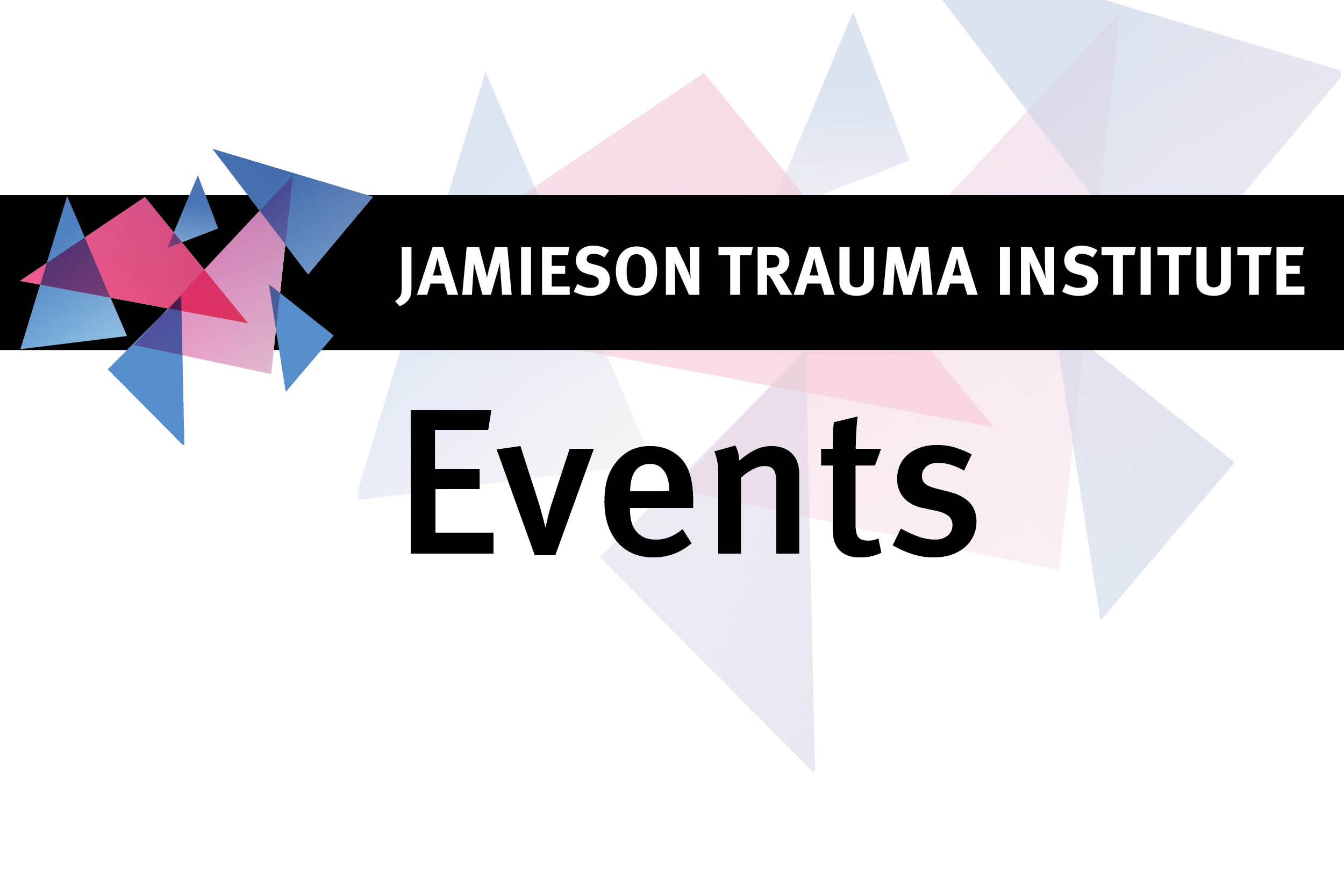
JTI Newsletter – May 2025
Welcome
Thanks to all who attended the JTI Showcase Event on the 20th March. This newsletter provides a brief summary of the great innovative projects that we at JTI, in collaboration with our extensive network of consumers, clinicians, researchers and funders, are progressing to prevent and minimise the impact of trauma.
We are also delighted to announce that JTI team members are involved in three successful MRFF Survivorship Care and Collaborative Research Prioritisation grants. In particular, Kirsten Vallmuur, Clifford Afoakwah and Michael Schuetz are chief investigators in the Advancing Care Through Injury Outcome Navigators (ACTION) Study, led by Prof Belinda Gabbe (Monash University), which has been awarded funding for five years with the goal to improve ongoing care of survivors with serious injury. Tanya Smyth will contribute as associate investigator to the ASPIRE study (A new scalable and sustainable platform to improve survivorship care for assault victims living with severe physical and psychological deficits), led by Prof Karen Caeyenberghs (Deakin University). Dylan Flaws is involved in Early targeted intervention for PTSD in young survivors of Paediatric Intensive Care: A Hybrid Effectiveness-Implementation Randomised Controlled Trial (PICU-CARE), led by Prof Debbie Long at Queensland University of Technology and part of a research program that was the recipient of seed funding from JTI as part of the Mental Health after Trauma grant program, back in 2021.
In addition, Kirsten Vallmuur, Angela Watson and Brett Droder were part of the team led by A/Prof Ben Beck (Monash University) awarded funding by the National Road Safety Action Grants program for the project Developing and implementing feasible and sustainable methods for collating and reporting incident and crash information for vulnerable road users. Cate Cameron is an investigator in the project Delivering fit for purpose rehabilitation together: Co-designing an action plan for high quality and accessible rehabilitation services, led by Dr Niru Mahendran at Surgical, Treatment and Rehabilitation Service (STARS) and funded by the RBWH Foundation.
These projects will continue JTI’s successful research contributions and partnerships to improve services and care from injury prevention to rehabilitation.
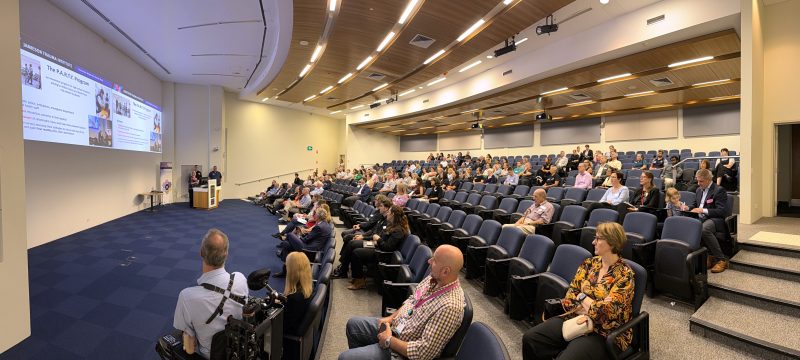
The JTI Showcase Event 2025
Initial experiences with SMART Ankle technology
Our consumer representative Mark McClusky shared his journey of recovery from an ankle fracture, and he and Alejandro Melendez-Calderon reflected on the many ways that wearable technology could empower the patient to manage their own care after surgery. JTI has provided advice and support to The Wesley Hospital, where the Wesley Research Institute is funding a study of the SMART Ankle technology, aimed at enhancing the management and rehabilitation of patients with ankle fractures. This innovative approach utilises BIOSensing technology to monitor patient recovery through a sensor and app. The initial feasibility study is showing promising results, with the technology streamlining patient care and providing real-time progress updates. The project, led by Michael Schuetz, highlights the potential of integrating advanced technology into orthopaedic rehabilitation.
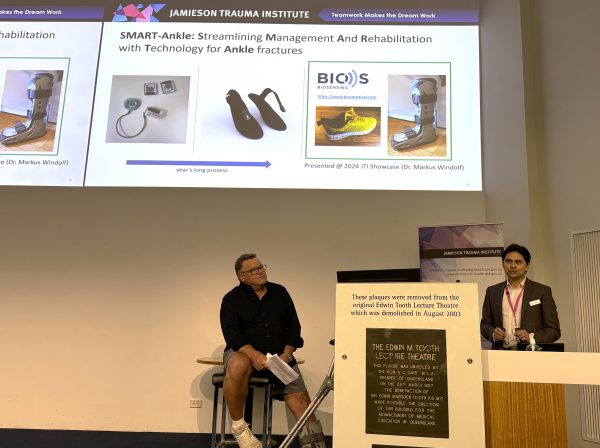
Alejandro Melendez-Calderon and Paul McClusky, the first study participant and consumer representative, discuss the benefits of SMART Ankle.
Device-related infection management: a multidisciplinary approach
Andrej Trampuz highlighted the importance of a multidisciplinary team in managing device-related infections. The case of Christine Ebrey, who underwent multiple surgeries and extensive antibiotic therapy, underscores the complexity of such infections. Key principles include accurate diagnosis, effective surgical intervention, and the use of systemic and local antibiotics. Andrej’s team is trialling innovations like D-lactate rapid tests and multisensor implants that may significantly change practice. The presentation concluded with a call for interdisciplinary collaboration to improve patient outcomes and reduce costs.
Save the date for the upcoming symposium on bone and joint infections in Brisbane, 28-29 August.
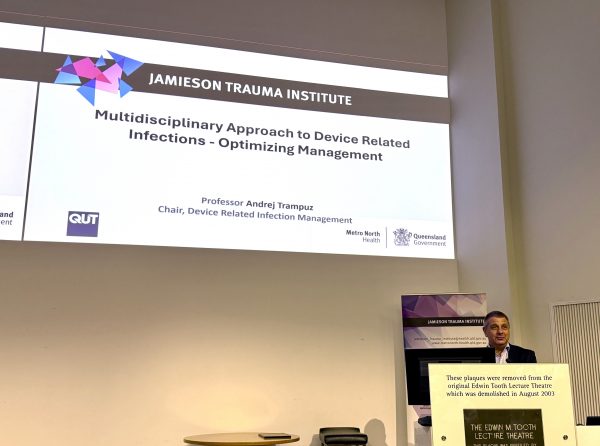
Andrej Trampuz presents the benefits of a multidisciplinary approach to device-related infections.
The EMPOWER Project – the first Brisbane 2032 Olympic and Paralympic Games Legacy Project
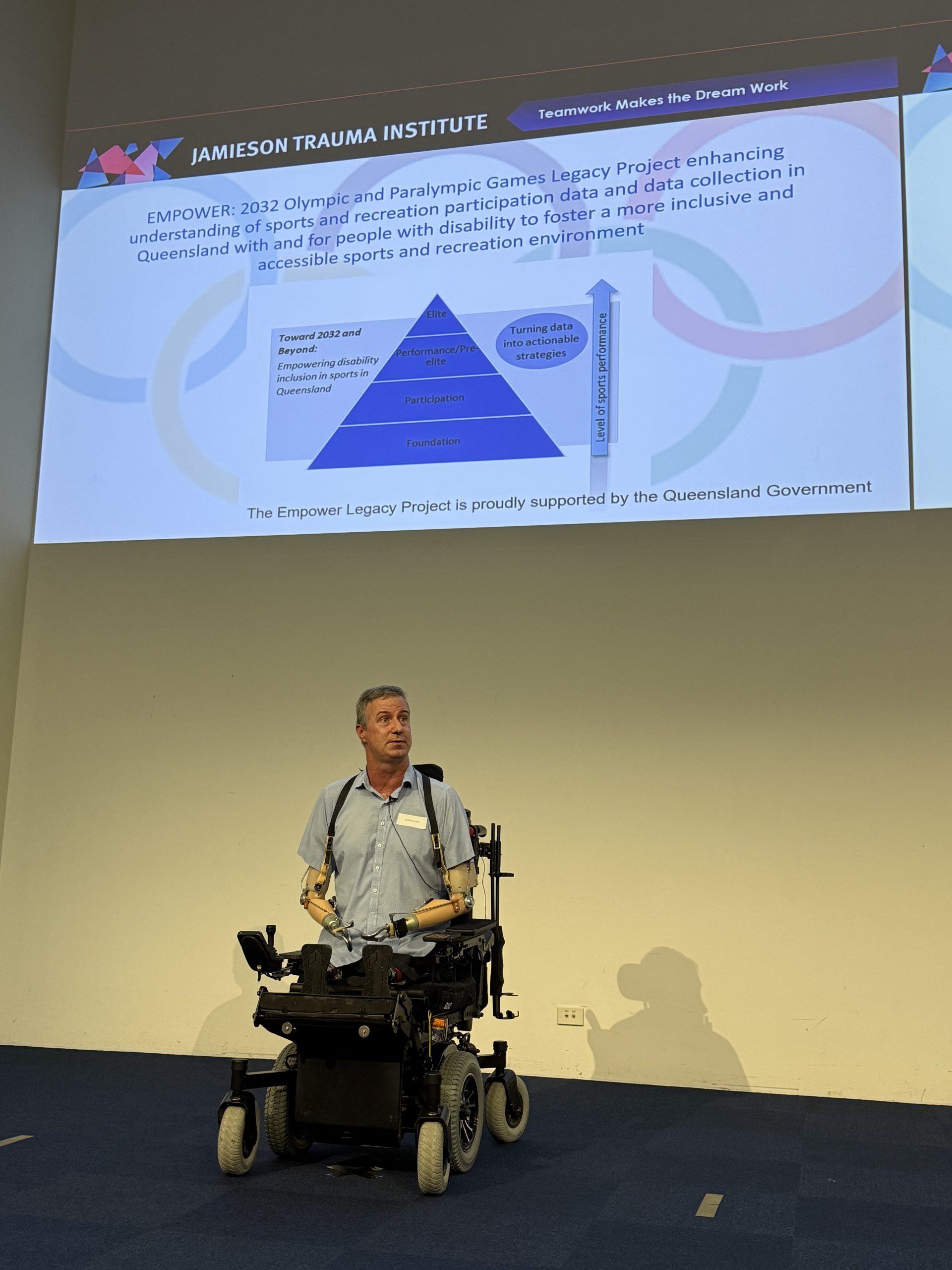
Matthew Ames introduces the EMPOWER project at the JTI Showcase event.
Matthew Ames officially launched the EMPOWER project, a partnership of JTI and Queenslanders with Disability Network (QDN), funded by the Queensland Government. EMPOWER will enhance the understanding and collection of data about participation of Queenslanders with disability in sport and recreation across the State.
Key stakeholders undertaking and championing the EMPOWER research with JTI and QDN are the Queensland University of Technology (QUT) and the Co-Design Team led by people with disability and lived experience. There are many other stakeholders contributing to and involved with the EMPOWER project including Griffith University, the University of Queensland (UQ), Sporting Wheelies and more.
EMPOWER through JTI, QDN and its wider collaborative network aims to produce evidence-based outcomes such as a long-term data collection framework for more inclusive and accessible sports and recreation participation for Queenslanders with disability. EMPOWER is working closely with the Department of Sport, Racing, Olympic and Paralympic Games, Queensland Government to develop a strong foundation for vibrant, inclusive communities and significantly improve overall community wellbeing for all Queenslanders with disabilities towards 2032 and beyond.
STOP THE BLEED®: Equipping bystanders to save lives
STOP THE BLEED® teaches Queenslanders life-saving bleeding control skills through hands-on training in techniques like applying pressure, wound packing, and tourniquet use. To enhance impact, the program is upgrading its training materials with immersive tools, including animation, e-learning modules, and interactive games tailored to Australian contexts. A high-fidelity simulation trial will evaluate their effectiveness against traditional instructor-led methods. In addition, yarning circle technique is being used by Local Area Committees of Queensland Ambulance Service for use in remote Indigenous communities. By adapting to local needs and leveraging cutting-edge methods, this initiative aims to increase bystander confidence and capability, with the ultimate goal to prevent deaths from traumatic bleeding.
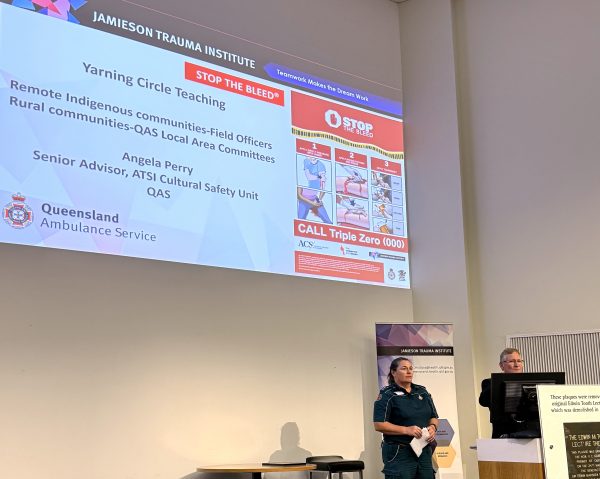
Angela Perry and Michael Muller present STOP THE BLEED®.
Injury Treatment and Rehabilitation Accessibility Queensland Index (iTRAQI)
Adam Rolley and Jacelle Warren presented the iTRAQI tool. Developed to address Queensland’s unique trauma care challenges, iTRAQI provides a comprehensive understanding of trauma care access, focusing on transport times for critically injured patients. The primary goal of iTRAQI is to provide a comprehensive understanding of the current state of trauma care access, particularly focusing on the time it takes for critically injured patients to reach the necessary medical facilities.
Read the full story here.
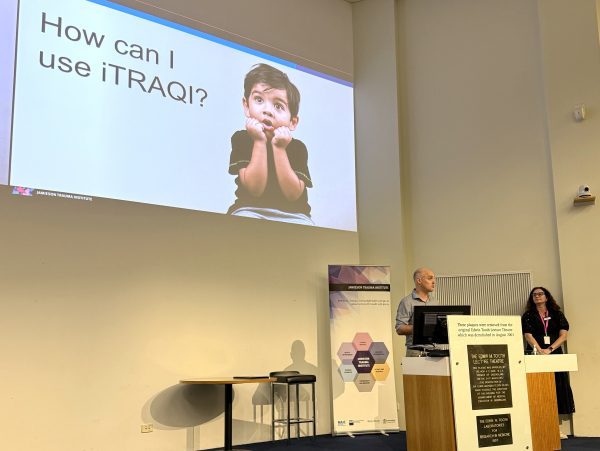
Adam Rolley and Jacelle Warren present iTRAQI.
After P.A.R.T.Y. video launches to strengthen injury prevention messages
The After P.A.R.T.Y. video builds on the impactful P.A.R.T.Y. (Prevent Alcohol and Risk-related Trauma in Youth) Program, a free initiative that educates over 4500 Queensland high school students annually. Research by Cate Cameron highlights the need for reinforcement of injury prevention messages, as student attitudes toward risk-related decisions decline within four months. This innovative pilot focuses on the ‘Fatal Five’ driving behaviours—speeding, driving under the influence, distraction, seatbelt neglect, and fatigue. Developed with consumer insights from Zach Nightingale, the initiative is a collaborative effort with MAIC, QUT, and the RBWH Prevention of Alcohol and Risk Related Trauma in Youth (P.A.R.T.Y.) Program.
Read the full story here.
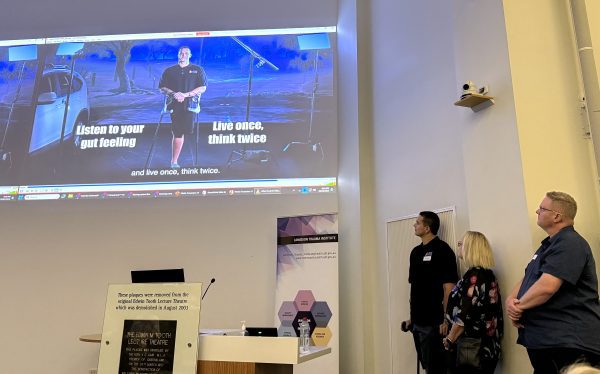
Zach Nightingale, Joe Carter and Cate Cameron present the After P.A.R.T.Y. video.
The Cliff Pollard Award 2025
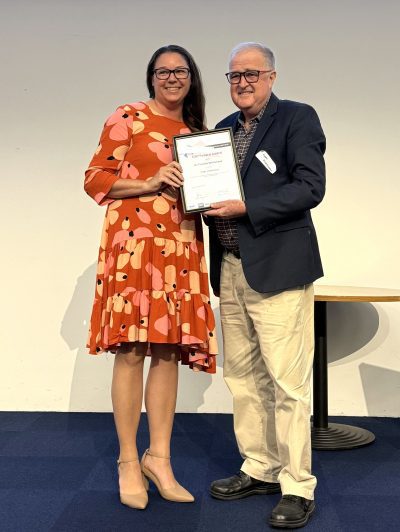
Frances Williamson receives the Cliff Pollard Award.
Dr Frances Williamson, Deputy Director of the Royal Brisbane & Women’s Hospital Trauma Service, received this year’s Cliff Pollard Award for her research on the use of opioids by trauma patients and her work creating awareness of this important issue. Fran’s research, in collaboration with Cate Cameron, found that about half of the patients with rib fractures required ongoing opioid prescriptions after discharge, with a quarter needing them beyond 90 days. Their findings highlight the need for targeted pain management strategies and further research.
The panel, chaired by Prof Gerry Fitzgerald, noted that this project is an important collaborative study with real world consequences, and would like to commend Fran and her team on their efforts to date with this project.
The Royal Brisbane & Women’s Hospital Foundation partners with JTI for the Cliff Pollard Award. The award honours a project which has shown impact and benefits to trauma care across Queensland.
Did you know…?
Did you miss the last JTI Showcase Event or the Ken Jamieson Lecture? Do you want to learn more about our key projects? Visit the JTI Digital Hub, hosted on the QUT MediaHub platform, where our videos, presentations and events are available for public viewing.
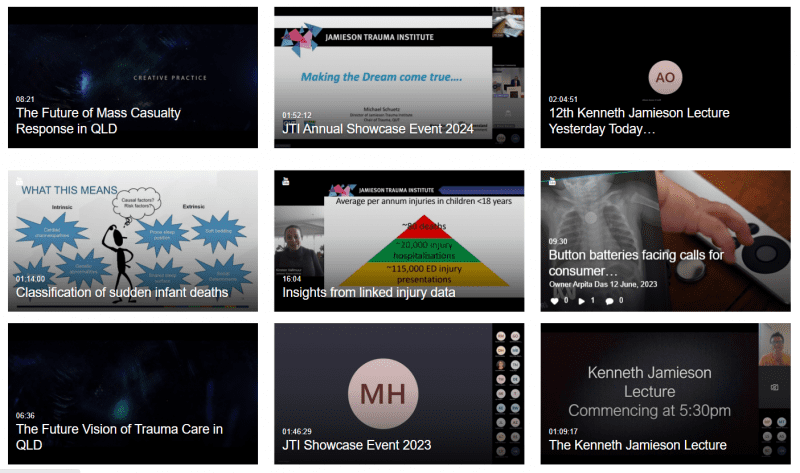
JTI Digital Hub

